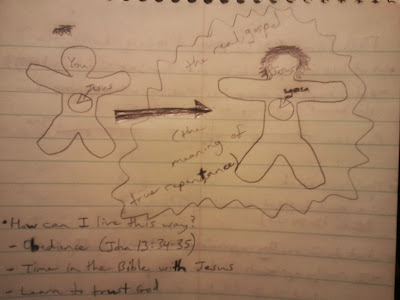 |
| Students from Chi Alpha WSU and U of I |
What struck me from the first passage that he preached on (the parables of the lost sheep, lost coin, and prodigal son in Luke 15) was how God is pleased to share His blessings with us, even when He knows that we're likely to just waste them. It doesn't make logical sense to me that the father of the prodigal son would give him "his share of the inheritance" even though, first of all, the father should only give an inheritance when he dies; and second of all, the son shouldn't get anything anyway, since he's not the oldest son.
Then, in the third preaching session, Michael taught about a very common misconception of salvation in a way that really stayed with me. Rather than attempt to describe it for you in words first, I am going to show you an image that I drew at the retreat to illustrate his point:
 |
| Diagram of salvation ideas |
Now, I will explain. In the figure on the left, it shows that Jesus is a part of your heart, indicating that you have invited Jesus to be in your life. However, in the figure on the right, we see that really, when you invite Jesus to truly be your Lord, you become a part of the body of Christ. This analogy reveals two important areas about salvation that I think are not accurately portrayed in a lot of Christian culture. First, it shows us that true repentance requires us to put aside our own plans for our lives, and acknowledge that God's Plan is both bigger and better than any plan that we could try to formulate. Second, we become aware of a need to act as a part of the body of Christ, rather than trying to act on our own will. This translates to a sense of belonging to and serving within Christian community.
So what exactly is God's heart? For us to hear His voice in our lives, and act on it. He has invited us to participate in His Plan together with Him, in a way that expands far beyond the reach we might ordinarily have. Granted, it is the greatest challenge of our Christian lives to try and live according to God's Plan, because it requires that we fully and completely trust Him to know what's best for us. I can think of no better way to end this post than with John 13:17, the same Bible verse that Michael ended the camp preaching with: "Now that you know these things, you will be blessed if you do them."

I think the way the inheritance was typically distributed was equally to all sons, with the oldest or "favored" son sometimes receiving a double portion. In an agrarian society, the sons would be farming along with the father throughout their lives and their portions would most likely be identified earlier than the father's death, especially when the father became disabled so he was no longer able to farm and maybe as early as when all the sons were adults. I did not look this up, so take what I say with a grain of salt!
ReplyDeleteThe first part of what you're saying sounds familiar, and I guess I just forgot that as I wrote this. I hadn't thought about the second thing you said, though, so that does put a slightly different spin on the parable of the Prodigal Son that I'd have to think about. Thanks for sharing!
ReplyDelete